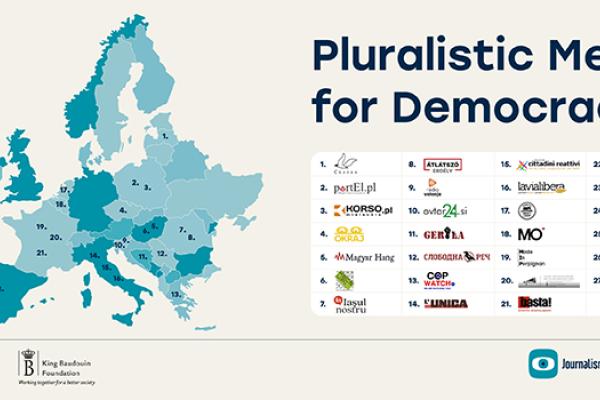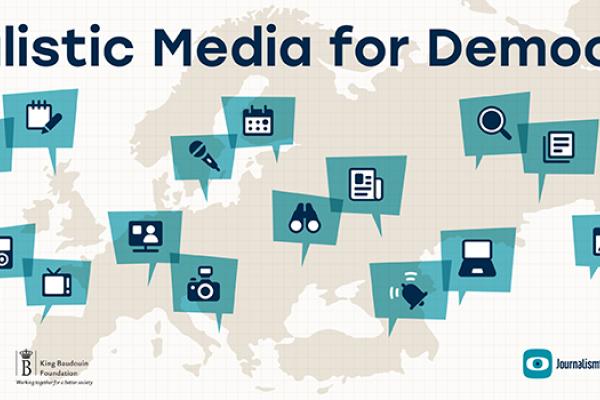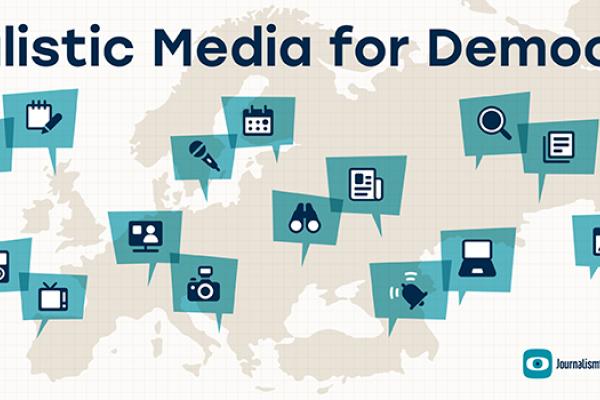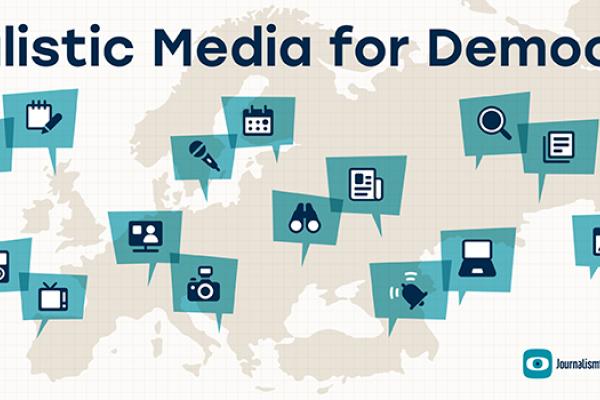Independent, local, regional and investigative media are key to ensuring that people can understand and exercise their rights in their communities. These outlets are well placed to gain the confidence of their local audiences and combat false and misleading information.
The grant programme aims to mentor and empower media organisations to continue their critical role in upholding democratic values, promoting diversity, equity and inclusion (DEI), and contributing to an informed public debate across Europe. This will be achieved through strategic support in innovation, business sustainability, diversity, equity and inclusion, and audience engagement.
The 27 media outlets are from the following countries: Belgium (1), Czech Republic (2), Finland (1), France (5), Greece (1), Hungary (4), Italy (4), Latvia (2), Netherlands (2), Poland (6), Portugal (7), Romania (4), Slovenia (3), Spain (3), Bosnia and Herzegovina (1), and Serbia (1). A total of €1,394,060 was distributed among the 46 proposals (€599,520 for the first call and €794,540 for the second call).
Check the list of granted media outlets and find out more about each project:
2nd call:
- Radio Velenje (NAŠ ČAS, d.o.o.) - Slovenia
- Made in Perpignan (Made in Perpignan) - France
- Alternativas Económicas (Alternativas Económicas) - Spain
- Portulano Digital (SETE Jornal) - Portugal
- L’Unica (TFCF S.R.L. - Facta.news) - Italy
- Iașul Nostru (Newsletters SRL) - Romania
- portEl.pl (Biuro Usług Informatycznych Softel) - Poland
- MO* (Wereldmediahuis) - Belgium
- Copwatch GR (The Policing Observatory) - Greece
- Sul Informação (Página em Branco) - Portugal
- The AI Postal Service (Postal do Algarve) - Portugal
- Átlátszó Erdély Egyesulet (Átlátszó Erdély Egyesulet) - Romania
- Splann! (Splann!) - France
- Alhambra-Press (Magyar Hang) - Hungary
- Ovtar24 (Kreativna PiKA d.o.o.) - Slovenia
- KecsUP News (Áramlat Alapítvány) - Hungary
- DIVERGENTE (Bagabaga Studios CRL) - Portugal
- AWR Korso Sp. z o.o. (Agencja Infor-Reklamowa AIR) - Poland
- CHAYKA (DAmedia) - Latvia
- Altominho.tv (Take Film, Produções Audiovisuais) - Portugal
- Gerila.info (Semper) - Bosnia and Herzegovina
- Sacrifice Zones (Cittadini Reattivi) - Italy
- lavialibera (lavialibera) - Italy
- Bureau Spotlight (Stichting Bureau Spotlight) - Netherlands
- Okraj.cz (JKS Média, z.s.) - Czech Republic
- Slobodna reč Portal (UG FENIKS Vranje) - Serbia
- basta! (Alter-Médias) - France
1st call:
- Barfuss (SuTi GmbH/srl) – Italy
- Debreciner (Együtt Debrecenért Egyesület)- Hungary
- Flagrant Déni (Flagrant Déni) – France
- FundaciónporCausa (FundaciónporCausa) – Spain
- Gazeta radomszczanska.pl (Mepress) – Poland
- Jaworznicki Portal Spolecznosciowy (Wydawnictwo) - Poland
- Marcelle le Média – (SAS Marcelle le Média) – France
- MédioTejo.net (Perspectiva D'outrora Associaçao Cultural) – Portugal
- Mensagem de Lisboa (Mensagem D’A Brasileira) – Portugal
- Naše Broumovsko (Naše Broumovsko) – Czechia
- Re:Baltica (The Baltic Center for Investigative Journalism) – Latvia
- RTV Horizon (Publieke Lokale Samenwerkende Radio) – Netherlands
- SC Inter-Media (SC INTER-MEDIA SRL) – Romania
- Szegeder (Szegeder.hu Alapítvány) – Hungary
- TUŁÓDŹ.PL (TUŁÓDŹ) - Poland
- uh.ro (Eko Papir) – Romania
- Verdelehti (Verdelehti Oy) - Finland
- Zasavske onlajn novice (Zon.si) – Slovenia
- Zawsze Pomorze (A1 Press Journalists for Pomerania Foundation) – Poland
As in the previous round, the jury selected all projects based on four key criteria: relevance, quality of content and activities, project management, innovation, and sustainability. These criteria were taken into account when determining the winners. The jury also assessed the extent to which each project upheld fundamental journalistic principles, such as being fact-based, accurate, independent, fair, impartial and accountable. Another crucial element in the final evaluation was the potential impact of each project on marginalised communities. All 46 selected projects were awarded a maximum implementation period of nine months.
The jury is anonymous and comprises four seasoned media professionals with expertise in local media across Europe. The jury makes its decisions independently, evaluating submitted project proposals according to the grant guidelines and assessment criteria, as well as the available budget.
During the two rounds of applications for the grant programme, Journalismfund Europe received a total of 246 applications (93 for the first call and 153 for the second call) from 27 different EU and non-EU countries. The applicants are registered/domiciled in Austria, Belgium, Bulgaria, Croatia, the Czech Republic, Denmark, Estonia, Finland, France, Germany, Greece, Hungary, Ireland, Italy, Latvia, Lithuania, Luxembourg, the Netherlands, Poland, Portugal, Romania, Slovakia, Slovenia, Spain, Sweden, Albania, Bosnia and Herzegovina, Montenegro, North Macedonia and Serbia.
The Pluralistic Media for Democracy project is a 24-month project co-funded by the European Union and launched by Journalismfund Europe and International Media Support (IMS).



